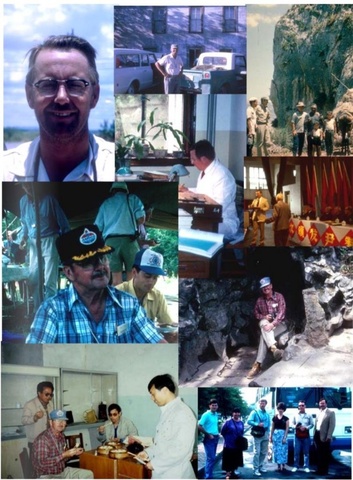Breadcrumb
- Home
- About
- Iowa Geode Stars
- Brian Glenister
Brian Glenister (1928-2012)
By Bill Raatz
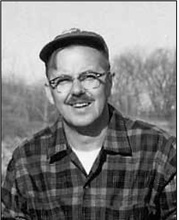
Professor Brian F. Glenister (1928 – 2012) was an invertebrate paleontologist, paleobiologist and biostratigrapher specializing in cephalopods, with particular interest in Permian ammonoids. His international reputation was established through the authorship of over 140 scientific publications, including major contributions to the Treatise of Invertebrate Paleontology (Part K Mollusca 3, nautiloid section (1964), and Part L (Revised) Mollusca 4, vol. 2 Carboniferous and Permian Ammonoidea (2009)). The breadth of his publication topics ranged from Ordovician to modern, tropical to arctic, and included conodonts, brachiopods, mollusks, international stratigraphic commissions, and the detailed sedimentologic and biologic study of modern Florida Bay.
Brian’s interests extended to application of biostratigraphy and paleoecology to address major questions regarding interpretation of facies, global correlations, the nature of mass extinction events, and science education. He was a passionate proponent for Geology literacy, teaching many Science Education majors through his Geology of Iowa course, and acting as a driving force behind the creation of the Devonian Fossil Gorge site at the Coralville Dam spillway.
Brian was a graduate student at the University of Iowa from 1954-1956, and professor from 1959 until his retirement in 1997, when he was awarded emeritus status. He held the A.K. Miller Professor of Geology chair from 1974-1997 and served as department chairman from 1968 to 1974 during the tumultuous period when the department moved from Calvin Hall to its current home in Trowbridge Hall. Brian received many honors and awards during his lifetime, including the Gilbert Harris Award from the Paleontological Research Institution (2000) and the Lifetime Education Award during the Sixth International Cephalopod Symposium (2004), in addition to serving as President of the Paleontological Society (1988-1989).
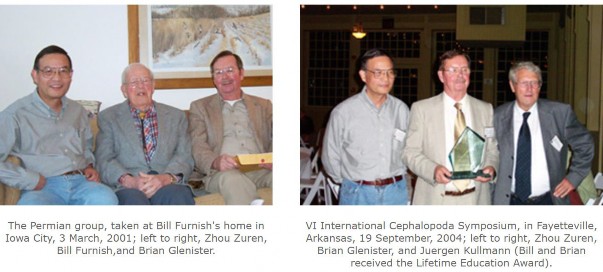
Life
Brian Franklin Glenister was born on September 28, 1928 in Albany, Western Australia. His father died four years later, and Brian was raised in difficult financial circumstances by his mother and elder sister. His interests in math and science led him to attend the University of Western Australia in Perth, earning a B.Sc. with double major in Math and Physics in 1948. A required Geology course led to his true passion, and he completed the undergraduate requirements for a Geology degree the following year. In 1950 he enrolled in the Geology M.Sc. program at the University of Melbourne, where he worked with cephalopod specialist Curt Teichert as an assistant. He received his degree in 1952 with a thesis on Devonian and Carboniferous spiriferid brachiopods from Western Australia. In 1953 he became Lecturer in Geology at the University of Melbourne, and in 1954 temporarily lectured at the University of Western Australia. In 1954 Brian received a Fulbright Scholarship to study cephalopods under Rousseau Flower at New Mexico Tech in Socorro, but fate intervened, and he came instead to Iowa City to work with A.K. Miller and W.M. Furnish. His dissertation focused on Devonian ammonoids from Western Australia, and he graduated with his Ph.D. in 1956. 1956 also saw his marriage to former graduate school office mate Anne Treloar, a marriage that would last until her death in 2010 and result in three children and five grandchildren.
In 1956 with Ph.D. in hand, Brian returned to the University of Western Australia as Lecturer and then Senior Lecturer in Geology. The opportunity to return to Iowa arose, however, and in 1959 he became a faculty member at the University of Iowa (as he was fond of stating, he joined the faculty on the 100th anniversary of the publication of Darwin’s On the Origin of Species). He was promoted to full professor in 1966. In 1968 along with C. Rexroad he organized the first meeting of the Pander Society, held in Iowa City.
Starting in 1978 Brian became heavily involved with the International Stratigraphic Commission defining stratotypes and formal definitions for Devonian-Carboniferous, Carboniferous-Permian, and Permian- Triassic boundaries. He was a titular member of the Permian Subcommission. Leading an international stratigraphic commission required all of Brian’s considerable charm, technical authority, and political savvy. It is a testament to his abilities that under his leadership the formal Permian System comprising the Cisuralian, Guadalupian, and Lopingian epochs was formally established.
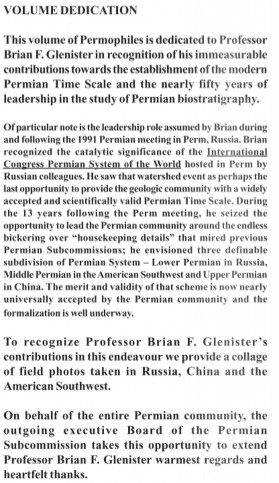
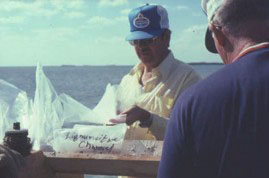
For many years Professor Glenister partnered with Alan B. Shaw and Amoco Oil Company to perform research in the modern carbonate environment of Florida Bay, and teach principles of facies and ecology to academic and industry students. This work was eventually published and now resides in the public domain (https://nmita.rsmas.miami.edu/flbay/index.htm).
A merging of his interests in geology and education presented itself with the floods of 1993, which overtopped the Coralville Dam and raced down the spillway, stripping fossiliferous Devonian bedding planes clean of topsoil and creating the Devonian Fossil Gorge. Brian founded and chaired a group of local citizens who raised over $400,000 and worked with the US Army Corps of Engineers to preserve the area and create an educational center. Over one million visitors have enjoyed the preserve and learned about Earth history due to this effort.
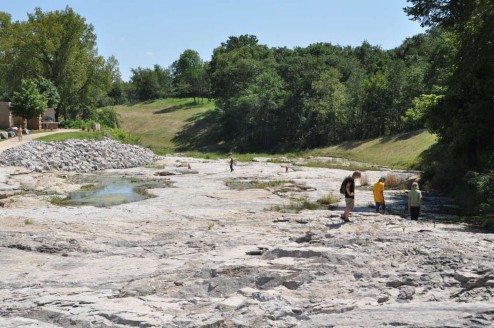
Impact and Personality
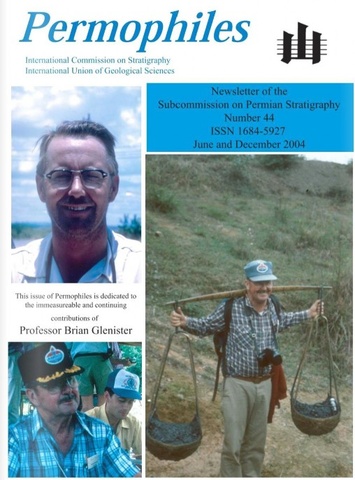
Professor Glenister was incredibly dedicated to the University of Iowa and the Department of Geology, so much so that he voluntarily capped his salary so that extra money would be available to hire and pay junior faculty. In the early 1990’s he expended enormous effort successfully saving the Department from serious attempts by the state to eliminate it by proving its core value and central mission to the university.
Glenister was larger than life, roaming the department with his white lab coat, broad Australian accent, and classic professorial demeanor. He was a raconteur, with his stories perpetually repeated in the grad student offices in the best Aussie accents we could muster. A favorite story: as a grad student, “I was so poor I could only afford one pork chop per diem, damn near got scurvy!” Or when describing how he became seriously ill after picking and eating the wrong mushrooms, “... suddenly everything turned a dark shade of purple.” When entering state park land on field trips where collecting was not allowed, he still always brought his hammer “…for decoration and protection”.
Brian had a wicked racquetball serve, a love of beer (Olympia) and rum (Batillaria sours- place a snail in the glass, and if it can crawl out the mix is not strong enough), a passion for orchids, a deep love for his family and the home they designed themselves overlooking the Coralville Reservoir, complete with solar panels and greenhouse. He hosted an annual department party at his home that strengthened department comradery.
Brian taught his students how to be paleontologists and geologists, but he also taught us how to write and think like scientists, and how important it is to communicate the ideas of science to the general public. How many advisors today sit with their students, shoulder to shoulder, and go over thesis drafts line by line, explaining how to improve writing style and clarity? His legacy lives on in the many majors and nonmajors he taught, and the 32 MS thesis and 24 Ph.D. dissertations he directed.
Sources
- Geological Society of America memorial, 2013: https://www.geosociety.org/documents/gsa/memorials/v42/Glenister-B.pdf
- Treatise of Invertebrate Paleontology Ammonoidea volume announcement: http://paleo.ku.edu/L2.html
- Florida Bay online database: https://nmita.rsmas.miami.edu/flbay/index.htm
- Permophiles Newsletter dedicated to Brian F. Glenister, 2004: https://www.yumpu.com/en/document/read/51670866/newsletter-of-the-subcom... stratigraphy-number-
- Geotimes article on the Devonian Fossil Gorge, 2001: http://www.geotimes.org/aug01/onexhibit.html
- Devonian Fossil Gorge visitor information: https://thinkiowacity.com/listing/devonian-fossil-gorge/
- University of Iowa College of Liberal Art and Sciences faculty biography: https://clas.uiowa.edu/faculty/brian-glenister-1928-2012
